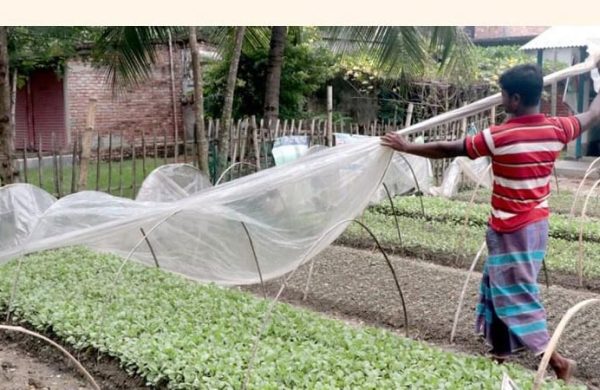Nursery business becomes a lucrative venture in Rajshahi
- Update Time : Monday, July 14, 2025

Rajshahi Correspondent:
Nursery business is getting popularity in Rajshahi as people in the region are showing tremendous interest for plantation of saplings of different varieties of trees.
The people particularly farmers are collecting saplings of fruits, wooden and medicinal trees aiming to plant in their
Farming lands for boosting financial conditions.
As part of the nationwide campaign, people in both urban and rural setting laid emphasis on tree plantation for making the planet liveable one. In urban areas, rooftop gardening are expanding as it ensured good environment alongside providing financial benefit.
Currently, nursery owners and workers are seen passing their busy times as they are closely involved in the entire process of growing sapling of trees because rainy season is suitable period of tree plantation.
Conventionally, this time is very vital for the nursery business as demands of seasonal vegetables, fruits and flowers mount to a greater extent.
Many of the micro-entrepreneurs set up makeshift shops at corners and intersections of roads and streets displaying seedlings and plants of vegetables, fruit and flowers on tubs and poly-bags to attract the buyers.
Hassan Al Sadi, 35, has established a commercial garden on around eight bigha of lands in Polashbari area under Paba upazila, with diversified flower plants attracting many flower-loving people to visit every day.
A resident of Chapainawabganj got inspiration for his own nursery after seeing a tulip garden at Shripur in Gazipur district and established his ‘dreamers garden’ in 2020. He also used the open spaces of the mango orchard for flower production by intercropping.
He said there is an enormous prospect of promoting flower farming in mango orchards as intercropping in the region because huge lands remain fallow more than six to eight months every year.
Zafar Iqbal, 52, a resident of Proshadpara village of the same upazila, has set a bright example in flower farming in the region.
Around three years back, he started flower farming on only ten katha of land, making a turning point in his life.
However, owners of the nurseries are now trying to check excessive rain by covering the seedbeds with polythene and are preparing to raise platforms or mancha to save them from rain.
Rajshahi region is well-known for producing various vegetables. The region has been surplus in vegetable production over the last couple of years.
Belly Begum, 45, has become economically solvent through farming of vegetables on homesteads as its demand has been increasing gradually in society.
A resident of Dighipara village under Paba upazila in the district, Begum is earning cash money through selling varieties of vegetables, including red amaranth, spinach, bottle gourd and Indian spinach (puishak), at present.
Rafiqul Islam, another worker of Bangla Nursery, said, saplings of early winter vegetables are being prepared. But heavy rain may cause root rot disease. “We are using polythene to save the seedlings”, he added.
Umme Salma, Deputy Director of Department of Agriculture Extension (DAE), said farmers are advised to spray anti-fungal medicine to save their seedlings.
Tazrul Islam, owner of Liza Nursery in Postal Academy area, each of the small-size flower seedlings is being sold at Taka 8-10, while the big size is at Taka 25-35 at present.
He said their professional work rises to a greater extent in winter compared to other seasons. Islam said 7-8 people work in his nursery as daily labourers every day.
Many enthusiastic youths and grassroots people have found the path of becoming successful entrepreneurs through flower farming with their investments.
More than 1,500 volunteers are encouraging farmers to cultivate the less water consuming crops through water resource management in 1,280 drought-hit villages of 39 Union Parishad and three municipalities in eight upazilas of Rajshahi, Naogaon and Chapainawabganj districts.
Dr Azizur Rahman, Additional Director of DAE, said they are ensuring food security through bringing the uncultivated fallen land and homestead under vegetable and fruit cultivation.
A total of 35 demonstration gardens of vegetables, fruits and spices were set up on the unused land in each of the unions under the project.












